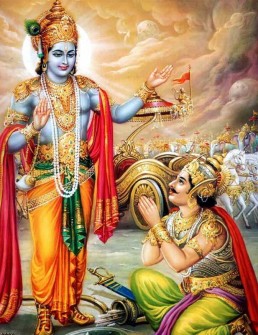Gita Chapter 8 – Verse 4 « »
अधिभूतं क्षरो भावः पुरुषश्चाधिदैवतम् ।
अधियज्ञोऽहमेवात्र देहे देहभृतां वर ॥ ८-४॥
adhibhūtaṃ kṣaro bhāvaḥ puruṣaścādhidaivatam
adhiyajño’hamevātra dehe dehabhṛtāṃ vara 8-4
ADHIBHUTA (or elements) constitutes My perishable nature, and the Indweller (or the essence) is the ADHIDAIVATA; I alone am the ADHIYAJNA here, in this body, O best of the embodied.
adhibhūtaṃ = the physical manifestation; kṣaraḥ = constantly changing; bhāvaḥ = nature; puruṣaḥ = the universal form; ca = and; adhidaivataṃ = called adhidaiva; adhiyajñaḥ = the Supersoul; ahaṃ = I (Krishna); eva = certainly; atra = in this; dehe = body; dehabhṛtāṃ = of the embodied; vara = O best.;

